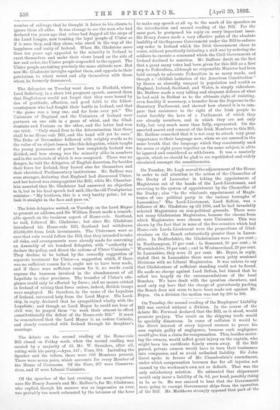Of the speeches of the last evening, the most important
were Sir Henry James's and Mr. Balfour's, for Mr. Gladstone, who replied, though his manner was as impressive as ever, was probably too much exhausted by the lateness of the hour to make any speech at all up to the mark of his speeches on the introduction and second reading of the Bill. For the most part, he postponed his reply on every important issue. Sir Henry James made a very effective point of the absolute inability of the Supreme Government under the Bill to enforce any order in Ireland which the Irish Government chose to resist, without practically initiating a civil war by ordering the soldiers to execute a command which the Civil Government of Ireland declined to sanction. Mr. Balfour dwelt on the fact that a great many votes had been given for this Bill as a first step to Federalism, although no responsible Minister had been bold enough to advocate Federalism in so many words, and though a "childish imitation of the American Constitution" by States so absurdly unequal in population and wealth as England, Ireland, Scotland, and Wales, is simply ridiculous.. Mr. Balfour made a, very telling and eloquent defence of what he had said in Belfast as to the ultimate right of resisting. even forcibly if necessary, a transfer from the Supreme to the Statutory Parliament, and showed how absurd it is to com- pare that resistance to the right of the Irish • people to resist forcibly the laws of a Parliament of which they are already members, and in which they are not only fully, but very much more than fully, represented. On the asserted assent and consent of the Irish Members to this Bill, Mr. Balfour remarked that it is not easy to attach very great importance to their language now, when we are assured in the same breath that the language which they consistently used for seven or eight years together on the same subject, is all to be ignored and considered as withdrawn. It was a masterly speech, which we should be glad to see republished and widely circulated amongst the constituencies.


















































 Previous page
Previous page